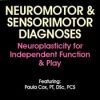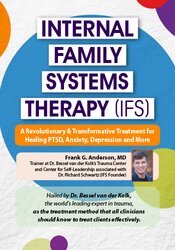Internal Family Systems Therapy (IFS) – Frank Anderson | Available Now !
$219.00 Original price was: $219.00.$74.00Current price is: $74.00.
Internal Family Systems Therapy (IFS) – Frank Anderson | Instant Download !
Sale Page_https://catalog.pesi.com/item/63415/
Archive: https://archive.fo/LVMLq
- Heal traumatic wounds at the cellular level
- Use meditative practices to have clients see their symptomology in a different way
- A non-pathological and accelerated approach to emotional well-being
- Everyone – no matter how sick – has healing inner resources
- Turn pathology and symptoms into inner resources and self-leadership
We all know what it is to feel conflicting emotions – “a part of me wants to …. and then there’s a part of me that doesn’t….” as we grapple with our internal self, desires, and behaviors.
Think about the family of emotions from Pixar’s movie Inside Out – how family of emotions, Joy, Sadness, Fear, Disgust and Anger all interacted inside Riley Anderson’s mind to form her reactions and memories.
Now you are thinking along the lines of IFS – Internal Family Systems Therapy.
Most modes of psychotherapy believe to have “parts” is pathological. NOT in IFS. In IFS the idea of multiplicity of the mind is normal. Every part has a good intention, and every part has value. All clients have the ability to heal themselves if they listen to their parts. IFS is a very powerful tool for clinicians. Once you see it in action, you’ll be hooked! And you’ll want to immediately incorporate it into your practice.
In developing IFS 30 years ago, creator Richard Schwartz, Ph.D., realized that clients were describing experiences with various parts, many extreme, within themselves.
When these parts felt safe and had their concerns addressed, they were less disruptive. In developing IFS, he recognized that, as in systemic family theory, parts take on characteristic roles that help define the inner world of the client.
Today, IFS has established a legacy of effectiveness in successfully treating many mental health issues and is being heralded as the treatment that all clinicians should know in order to treat clients effectively (van der Kolk 2015).
Join IFS and trauma expert Frank Anderson, MD, colleague of Dr. Bessel van der Kolk and Dr. Richard Schwartz, in this transformational training day and learn of all that IFS therapy can do for you and your clients!
Like Dr. Anderson, after integrating IFS into your work, you will transform your practice. Clients will leave your office feeling healed, with skills to use outside the therapy room to help them master their emotions.
This special day’s training will include experiential exercise, meditation and video demonstration. You will leave transformed!
OUTLINE
Internal Family Systems (IFS): Permanently Heal Your Clients Trauma
- Origins of IFS – the work of Richard Schwartz, PhD
- A non-pathologizing, accelerated approach rooted in neuroscience
- Apply inner resources and self-compassion for healing
- How to heal implicit memory wounds at the cellular level
- Harness neuroscience for techniques that cure traumatic wounds
The IFS Technique
Step 1: Identifying the Diagnoses & Symptoms
- Assess the diagnoses: PTSD, anxiety, depression, substance abuse and eating disorders
- Apply Meditation practices
- Finding the symptom
- Focusing on its fear
- Separating the person (self) from the symptom
- Becoming curious about it
- Find the real story behind the symptom
Step 2: Gain Access to Internal Strengths & Resources for Healing
- Moving from defensiveness to curiosity
- Access compassion to open the pathways toward healing
- Foster “internal attachment” work
- The “Self” of the therapist-countertransference redefined
Step 3: Permanent Healing of the Traumatic Wound
- Three phases to healing the wound:
- Witness the pain
- Remove the wounded part out of the past
- Let go of the feelings, thoughts and beliefs
- Memory reconsolidation & neuroscience
Integrate IFS into Your Treatment Approach
- EMDR, DBT, Sensorimotor and other methods
- Transformation vs adaptation or rehabilitation
- Going beyond the cognitive
- Integrate IFS with your current clinical approach
1 review for Internal Family Systems Therapy (IFS) – Frank Anderson | Available Now !
| 5 star | 100 | 100% |
| 4 star | 0% | |
| 3 star | 0% | |
| 2 star | 0% | |
| 1 star | 0% |
Sorry, no reviews match your current selections
Q & A
Ask a question
Your question will be answered by a store representative or other customers.
Thank you for the question!
Your question has been received and will be answered soon. Please do not submit the same question again.
Error
An error occurred when saving your question. Please report it to the website administrator. Additional information:
Add an answer
Thank you for the answer!
Your answer has been received and will be published soon. Please do not submit the same answer again.
Error
An error occurred when saving your answer. Please report it to the website administrator. Additional information:
Related products
NLP & Hypnosis
NLP & Hypnosis
Ecommerce
Ecommerce












Super fast shipping! Excellent Quality ! | Internal Family Systems Therapy (IFS) – Frank Anderson